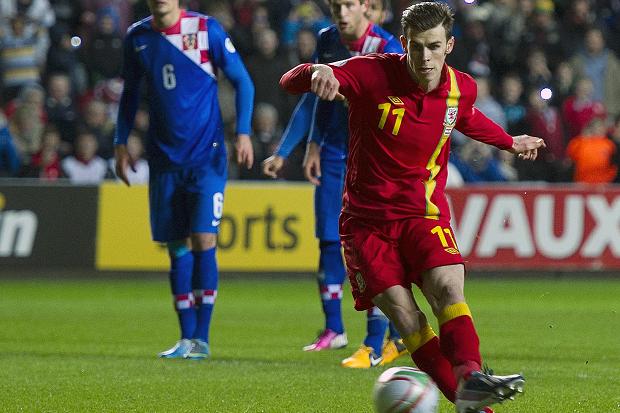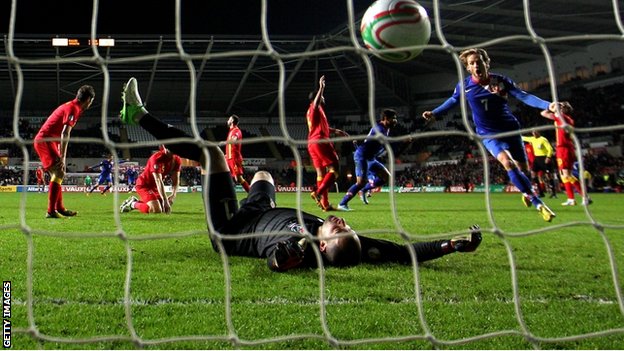 Good luck to Iceland, it would be great to see them at Brazil 2014 with one of our players captaining them, but have a look at their qualifying group table and compare it to ours. Switzerland, who we beat quite comfortably at Swansea in Euro 2012 qualifying, look on their way to winning the group while Norway, who surely would have been favourites to finish in the top two at the time of the draw, don’t look to be the power they once were. The Norwegians still can’t be ruled out of course, but, for now, it’s Aron Gunnarsson’s team and Albania who look best placed to reach the Play Off’s.
Good luck to Iceland, it would be great to see them at Brazil 2014 with one of our players captaining them, but have a look at their qualifying group table and compare it to ours. Switzerland, who we beat quite comfortably at Swansea in Euro 2012 qualifying, look on their way to winning the group while Norway, who surely would have been favourites to finish in the top two at the time of the draw, don’t look to be the power they once were. The Norwegians still can’t be ruled out of course, but, for now, it’s Aron Gunnarsson’s team and Albania who look best placed to reach the Play Off’s.
The amazing thing is that Iceland, like Wales, found themselves in pot six in the draw for the qualifying groups for World Cup 2014, so, although being bottom seeds undoubtedly makes life harder for the country concerned, it doesn’t have to mean an end to any hopes of qualifying. However, a little bit of luck with the order in which the balls are drawn wouldn’t go amiss and, typically, Wales didn’t have much of that commodity back in July 2011 when the draw was made. Serbia, Scotland and Macedonia (disparagingly and arrogantly called the group “minnows” in the local press in the last few days) aren’t bad teams to be drawn with at all when we’re supposed to be the weakest side in the Group, but to draw Belgium just when their “golden generation” of young players are finally living up to the hype was unlucky. When you also consider that we came up against a country who could arguably be called the most successful in Europe if your criteria for measuring that success is qualifications for major tournaments based on population, then we were very unlucky – the other four teams in our group were always likely to be also rans when it came to a top two spot.
Croatia are the example to follow for those countries with a population of less than 5 million and for them to be, deservedly, ranked in the top ten countries in the world is an outstanding achievement. To do that, you need strength in depth and, for me, this was probably the decisive factor in their deserved, but slightly fortunate given the time of the winning goal, 2-1 win over Wales at the Liberty Stadium last night. When a country with the sort of population Croatia has does well on the world football stage, it’s usually because they are fortunate enough to have three or four very talented players all come along at the same time with a group of ten to twelve good solid performers to back them up, but, for nearly twenty years now, Croatia have been consistently producing outstanding players who, obviously, put great store in representing their country.

Gareth Bale takes the penalty which gave Wales the lead – I reckon it would have been our best win since Italy in 2002 if we could have held on.
If football was still a game of eleven against eleven where substitutions were not allowed, then Wales may just have been able to finish off the job when they led 1-0 after a high quality first half last night. Croatia were obviously wary of Wales’ attacking pace and, although they were having to absorb a fair amount of pressure, they were defending well – any side who can go from defending near their own corner flag to putting one of the best players in the world clean through on goal within less than ten seconds has to be given respect.
Gareth Bale has become so good that you tend to take the excellent first touch which enabled him to advance for his one on one with Pletikosa for granted and it was a genuine shock when he knocked his shot over the crossbar. At the time, Bale’s miss had the feel of a match defining moment, but was it really? Despite my earlier comments, I’m not sure it was, would Wales have been able to have come through the searching examination which was the second half with a win if they had been an extra goal up at the interval? My feeling is that they wouldn’t, but I would have backed them not to lose from such a position.
Bringing on a defender for a midfield player at half time looked a strange move by Croatia coach, but Schildenfeld’s introduction brought about a change to 3-5-2, which, effectively, gave his team a numerical advantage in midfield as Srna (who plays like a wing back when he’s supposed to be a full back!) became a winger and Strinic a wing back. This move forced Robson-Kanu and Williams on the Welsh flanks to drop a little deeper and Bellamy and Bale became more isolated. All of this proved that Stimac had the resources on his bench to successfully incorporate other tactical approaches. He was also then able to introduce Mateo Kovacic, an 18 year old midfield player with Inter Milan, who was rated as his country’s man of the match in Friday’s win over Serbia and go for the Welsh throat in the last twenty minutes by bringing on eighty three times capped Ivica Olic to play as a left winger.
For some reason, I was always doing something else when the substitutes Chris Coleman had available to him were shown on the screen, so as the second half began with Wales being forced further and further back, I began to implore our manager to make changes. At the time I was pretty baffled by the introduction of Jazz Richards into our midfield in place of Robson-Kanu and I’m sure Simon Church for Williams later on hardly had Croatia shaking in their boots. However, my outbreak of Coleman bashing which greeted the final whistle soon subsided when I finally got to see who he’d had to choose from. Sam Vokes might have been worth a try as we looked to bombard their penalty area once we went behind, but where Crotia had very promising youngsters who were at one of Europe’s top clubs and strikers with more caps than anyone in the Welsh squad to draw on, we had players who have been performing at Championship level or worse this season – as I mentioned earlier, when it was starting eleven against starting eleven it was a competitive and entertaining encounter, but once substitutes started being introduced it became an uneven contest.

Eduardo wins it late on for Croatia – the result was right, but we showed we can cause good International sides problems, even with what was virtually a second string midfield.
Still, it was another encouraging display by Wales – besides the higher profile performers like Bellamy, Bale and the precocious Johnny Williams, there were some good individual performances. To describe James Collins’ display as his best in a Welsh shirt for years is damning him with faint praise somewhat given his habit of making at least one expensive error per cap lately, but it was much better from him – he played as you hoped someone who has so much Premiership experience would do. In front of Collins, Joe Ledley turned in his second very good performance in four days – his contribution to the move which led to him being fouled for our penalty showed a footballing ability that his critics tend to ignore, but, mostly, he kept things simple as he unselfishly gave help to team mates. I’ve looked at Ledley in the last three seasons and wondered if his move to Celtic has improved him, well, watching him on Friday and, in particular. last night in a Welsh midfield missing Ramsey. Allen, Collison, Vaughan and Crofts, I think it has – City could do a lot worse than sign him if we get promoted.
Ben Davies was another one to have a very good pair of matches, while that was the best I’ve seen Boaz Myhill play at International level (I wouldn’t blame him too much for their equaliser). Overall, I feel this has been a good international fortnight for Chris Coleman and his team – the home match with Serbia (the chance for revenge after that 6-1 loss should be enough motivation for Wales) and the couple of game with the “group minnows” are winnable. A decent return from these matches will confirm the feeling that a talented young squad are getting there. It’s happening more slowly than many would want, but we have to be realistic – if we can get into pot four for the draw for Euro 2016, that’s considerable progress from where we were and we wouldn’t have to rely on the sort of luck Iceland have had to stand a chance of qualifying.


